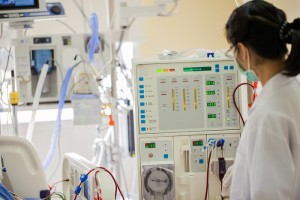Dialysis
Dialysis is a treatment that does some of the functions performed by your healthy kidneys. It is medically indicated when your own kidneys can no longer provide the functions your body needs. When your kidneys fail, dialysis treatment keeps your body in balance by:
Types Of Dialysis
Peritoneal Dialysis
Hemodialysis is a treatment that removes extra fluid and wastes from the body by constantly moving the blood through a filter. The filter, known as a dialyzer or artificial kidney, is used with a dialysis machine. In this dialyzer the blood is cleaned before being returned to the body. If you choose hemodialysis, an access site must be created In order to reach your blood. The best access is a fistula, created from your own blood vessels, which allows the best blood flow and the least chance of infection. It takes 6 months to a year for a fistula to heal and become mature enough for use, so timing is important. In some cases, when dialysis must be administered in an emergency due to kidney failure, or if a fistula is unable to be placed, a chest catheter must be used. This is the least preferable, because it has a risk of infection.

Hemodialysis
In-Center Hemodialysis
Hemodialysis is most often preformed in a dialysis clinic. Each clinic has a healthcare team, including nurses and patient care technicians to help administer your treatment. In-Center Hemodialysis is a treatment for patients where a machine filters wastes, salts and fluid from your blood when your kidneys are no longer healthy enough to do this work adequately. Hemodialysis is the most common way to treat advanced kidney failure. Treatments in the center are scheduled in shifts throughout the day for 3-4 hours, three times a week. The procedure can help you carry on an active life despite failing kidneys. You may be able to do hemodialysis at home which is referred to as Home Hemodialysis (HHD).
Home Hemodialysis
Home Hemodialysis (HHD) is an alternative to a clinic-based dialysis treatment because it is performed in a familiar environment- the ESRD patient’s own home. Different types of home dialysis allow patients to adapt their treatment to their everyday routine. Every patient and type of treatment has its own challenges. Talk with your doctor and healthcare team about which treatment plan may be best for you.

